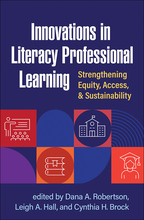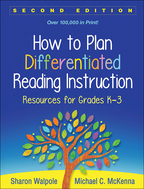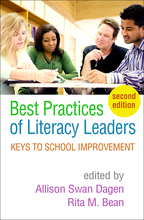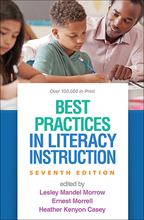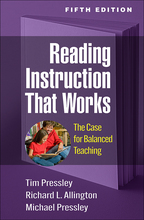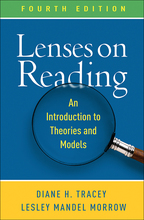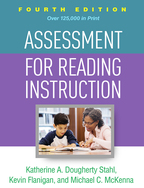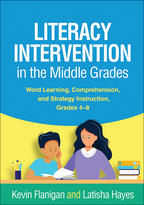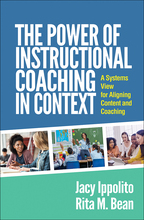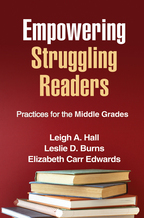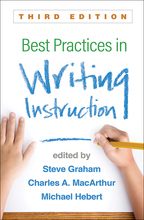Innovations in Literacy Professional Learning
Strengthening Equity, Access, and Sustainability
Edited by Dana A. Robertson, Leigh A. Hall, and Cynthia H. Brock
HardcoverPaperbacke-bookprint + e-book
Hardcover
orderFebruary 2, 2023
ISBN 9781462551309
Price: $65.00 276 Pages
Size: 6" x 9"
Paperback
orderFebruary 14, 2023
ISBN 9781462551293
Price: $43.00276 Pages
Size: 6" x 9"
e-book
orderJanuary 23, 2023
PDF and Accessible ePub ?
Price: $43.00 276 Pages
ePub is Global Certified Accessible
print + e-book $86.00 $51.60
orderPaperback + e-Book (PDF and Accessible ePub) ?
Price: 276 Pages
ePub is Global Certified Accessible
“True to its title, this book conveys leading-edge ideas. It offers practical ideas for PL that ensures teachers and students alike are supported to learn and to sustain their learning. The book emphasizes that teachers must continually evaluate and grow their instructional practice through just-right, just-at-the-right-time learning experiences. It shares insights that will make such professional growth a reality. This powerful work is a major contribution to the development of teacher learning.”

—Diane Lapp, EdD, Distinguished Professor of Education, San Diego State University; instructional coach, Health Sciences High and Middle College
“This book shows the power of educators working together. When teachers and school leaders collaborate to find solutions for student literacy, students win!”

—Wayne Tuttle, MEd, Assistant Principal, Kelly Walsh High School, Casper, Wyoming
“From editors and contributors who have successfully implemented PL in a variety of contexts, the book offers detailed insights into issues of equity and sustainability. Readers learn about a range of practices drawing on the role of cognitive access, contextual fit, and agency to address challenges and opportunities associated with PL. This book could be used for graduate-level courses in literacy coaching and supervision. Courses on professional development/learning would benefit from the book, as it takes a wide lens on the overall concepts associated with PL.”

—Virginia J. Goatley, PhD, Interim Dean, School of Education, University at Albany, State University of New York
“In my 30 years of research and involvement in PL, there have been many well-intentioned changes to PL practices—most of them linked to accountability, accreditation, and mandates. Teachers have lacked opportunities to improve their knowledge and pedagogy based on their own understanding of what they and their students need. This book is a breath of fresh air! School, district, and community leaders grappling with the complexities of literacy learning today will find numerous innovative ideas that resonate with their contexts and challenges.”

—Jan B. Turbill, PhD, School of Education, University of Wollongong, Australia
“This volume takes seriously the importance of planning and delivering highly contextual PL for literacy teachers. Resisting the tendency to standardize, commercialize, and scale up PL, the editors and contributors demonstrate the imperative to understand and value the uniqueness of each context and the range of people in it. The adaptive expertise of teachers shines through. The book shows that when literacy PL is personalized, the outcomes are heightened levels of innovation, teacher agency, and sustainability. School leaders, department heads, early-career teachers, and student teachers will see themselves and others in one or more of the case studies, and through that process will better recognize the multiple opportunities and pathways to improve students' learning.”

—Beryl Exley, PhD, School of Education and Professional Studies, Griffith University, Queensland, Australia
—Diane Lapp, EdD, Distinguished Professor of Education, San Diego State University; instructional coach, Health Sciences High and Middle College
“This book shows the power of educators working together. When teachers and school leaders collaborate to find solutions for student literacy, students win!”
—Wayne Tuttle, MEd, Assistant Principal, Kelly Walsh High School, Casper, Wyoming
“From editors and contributors who have successfully implemented PL in a variety of contexts, the book offers detailed insights into issues of equity and sustainability. Readers learn about a range of practices drawing on the role of cognitive access, contextual fit, and agency to address challenges and opportunities associated with PL. This book could be used for graduate-level courses in literacy coaching and supervision. Courses on professional development/learning would benefit from the book, as it takes a wide lens on the overall concepts associated with PL.”
—Virginia J. Goatley, PhD, Interim Dean, School of Education, University at Albany, State University of New York
“In my 30 years of research and involvement in PL, there have been many well-intentioned changes to PL practices—most of them linked to accountability, accreditation, and mandates. Teachers have lacked opportunities to improve their knowledge and pedagogy based on their own understanding of what they and their students need. This book is a breath of fresh air! School, district, and community leaders grappling with the complexities of literacy learning today will find numerous innovative ideas that resonate with their contexts and challenges.”
—Jan B. Turbill, PhD, School of Education, University of Wollongong, Australia
“This volume takes seriously the importance of planning and delivering highly contextual PL for literacy teachers. Resisting the tendency to standardize, commercialize, and scale up PL, the editors and contributors demonstrate the imperative to understand and value the uniqueness of each context and the range of people in it. The adaptive expertise of teachers shines through. The book shows that when literacy PL is personalized, the outcomes are heightened levels of innovation, teacher agency, and sustainability. School leaders, department heads, early-career teachers, and student teachers will see themselves and others in one or more of the case studies, and through that process will better recognize the multiple opportunities and pathways to improve students' learning.”
—Beryl Exley, PhD, School of Education and Professional Studies, Griffith University, Queensland, Australia

